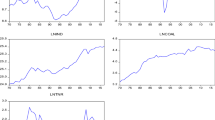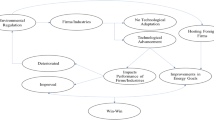Abstract
The existing oil import dependence index cannot exactly measure the economic cost or scales, and it is difficult to describe the economical aspect of oil security. To measure the foreign dependence of one country’s economy and reflect its oil economic security, this paper defines the net oil import intensity as the ratio of net oil import cost to GDP. By using Divisia Index Decomposition, the change of net oil import intensity in five industrialized countries and five newly industrialized countries during 1971–2010 is decomposed into five factors: oil price, oil intensity, oil self-sufficiency, domestic price level and exchange rate. The result shows that the dominating factors are oil price and oil intensity; moreover, the newly industrialized countries have higher net oil import intensity than industrialized countries.
Similar content being viewed by others
References
Bacon R, Kojima M. Vulnerability to Oil Price Increases: A Decomposition Analysis of 161 Countries [R]. Working Paper, 48422. World Bank, Washington DC, USA, 2008.
Energy Sector Management Assistance Program. The Vulnerability of African Countries to Oil Price Shocks. Major Factors and Policy Options: The Case of Oil Importing Countries[R]. ESMAP Formal Report, 308/05. ESMAP, Washington DC, USA, 2005.
Asia Pacific Energy Research Centre. A Quest for Energy Security in the 21st Century: Resources and Constraints[R]. APERC, Tokyo, Japan, 2007.
Gupta E. Oil vulnerability index of oil-importing countries [J]. Energy Policy, 2008, 36(3): 1195–1211.
Bacon R, Kojima M. Oil price risks: Measuring the vulnerability of oil importers [J]. Viewpoint, 2008, 320: 1–4.
Kojima M. Vulnerability to Higher Oil Prices: Decomposition Analysis of 158 Countries Between 2003 and 2008 [R]. Working Paper. World Bank, Washington DC, USA, 2011.
Yepez-Garcia R A, Dana J. Mitigating Vulnerability to High and Volatile Oil Prices Power Sector Experience in Latin America and the Caribbean[R]. Working Paper, 69944. World Bank, Washington DC, USA, 2012.
Liao H, Wang C, Zhu Z S et al. Structural decomposition analysis on energy intensity changes at regional level [J]. Transactions of Tianjin University, 2013, 19(4): 287–292.
Ang B W. Decomposition analysis for policymaking in energy: Which is the preferred method? [J]. Energy Policy, 2004, 32(9): 1131–1139.
IEA. Oil Supply Security: Emergency Response of IEA Countries 2007[EB/OL]. http://www.iea.org/publications/freepublications/publication/oil_security.pdf, 2007.
Wei Y M, Liao H. China Energy Report (2010): Energy Efficiency Research [M]. Science Press, Beijing, China, 2010 (in Chinese).
Hamilton J D. Nonlinearities and the macroeconomic effects of oil prices [J]. Macroeconomic Dynamics, 2011, 15(s3): 364–378.
BP. BP Energy Outlook 2030[EB/OL]. http://www.bp.com/content/dam/bp/pdf/statistical-review/BP_World_Energy_Outlook_booklet_2013.pdf, 2013.
Cabalu H, Manuhutu C. Vulnerability of natural gas supply in the Asian gas market[J]. Economic Analysis and Policy, 2009, 39(2): 255–270.
Wei Y M, Wu Gang, Liang Q M et al. China Energy Report (2012): Energy Security Research [M]. Science Press, Beijing, China, 2012 (in Chinese).
EIA. China Poised to Become the Worldfs Largest Net Oil Importer Later This Year[EB/OL]. http://www.eia.gov/todayinenergy/detail.cfm?id12471, 2013.
Author information
Authors and Affiliations
Corresponding author
Additional information
Supported by the National Natural Science Foundation of China (No. 71273027 and No. 71322306).
Rights and permissions
About this article
Cite this article
Liao, H., Xu, Z. & Wang, C. Divisia decomposition method and its application to changes of net oil import intensity. Trans. Tianjin Univ. 20, 72–78 (2014). https://doi.org/10.1007/s12209-014-2306-7
Accepted:
Published:
Issue Date:
DOI: https://doi.org/10.1007/s12209-014-2306-7




